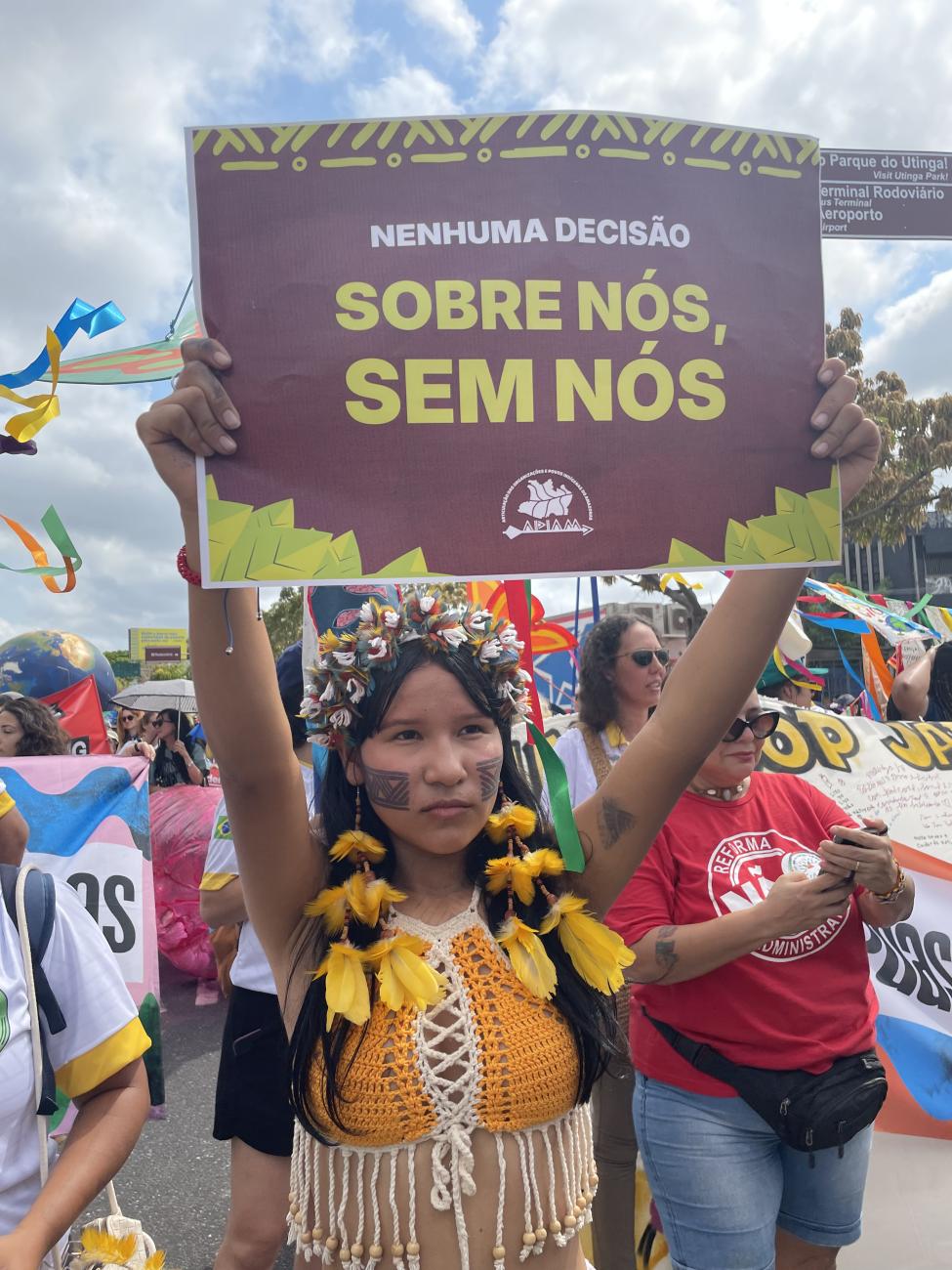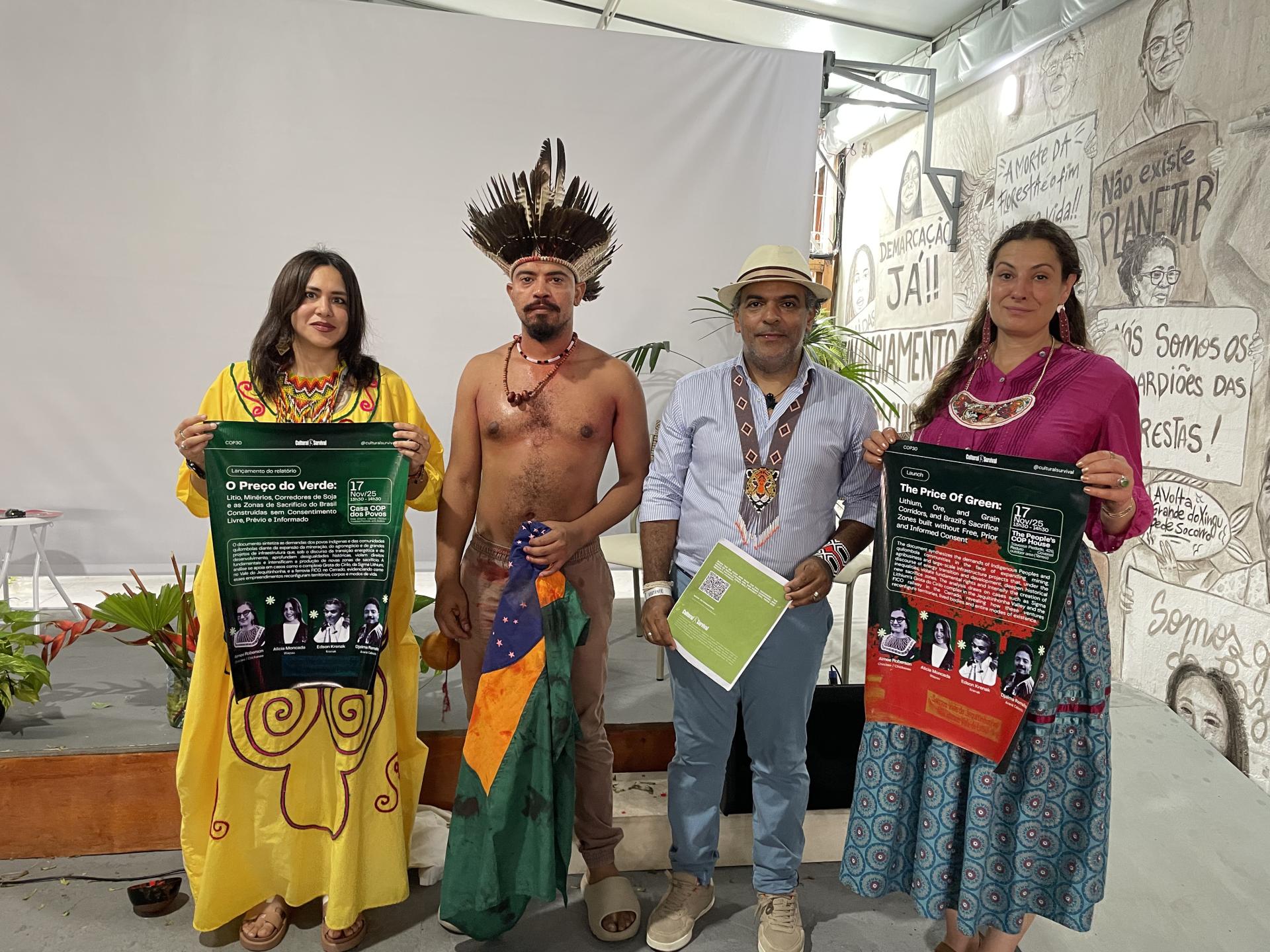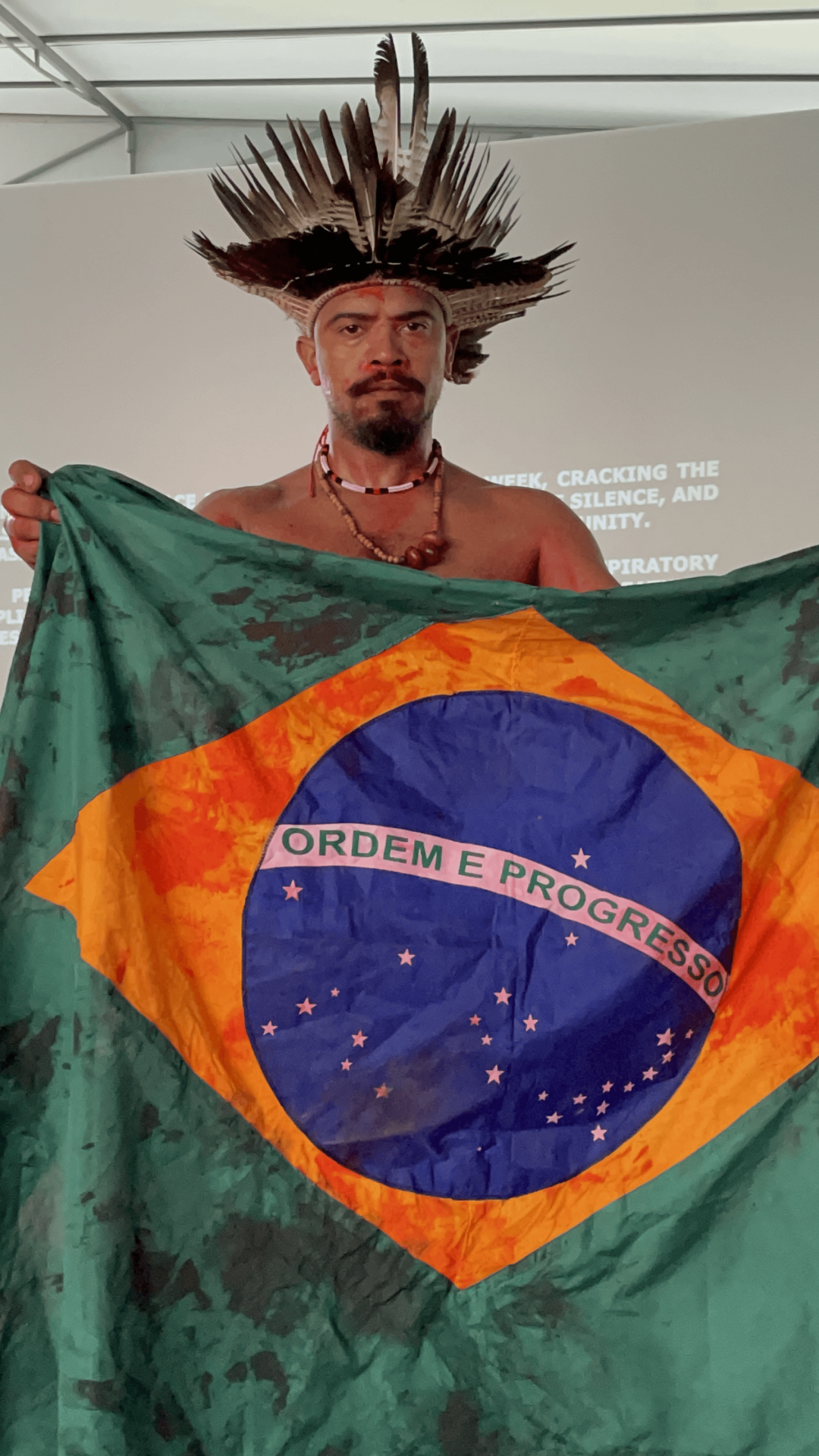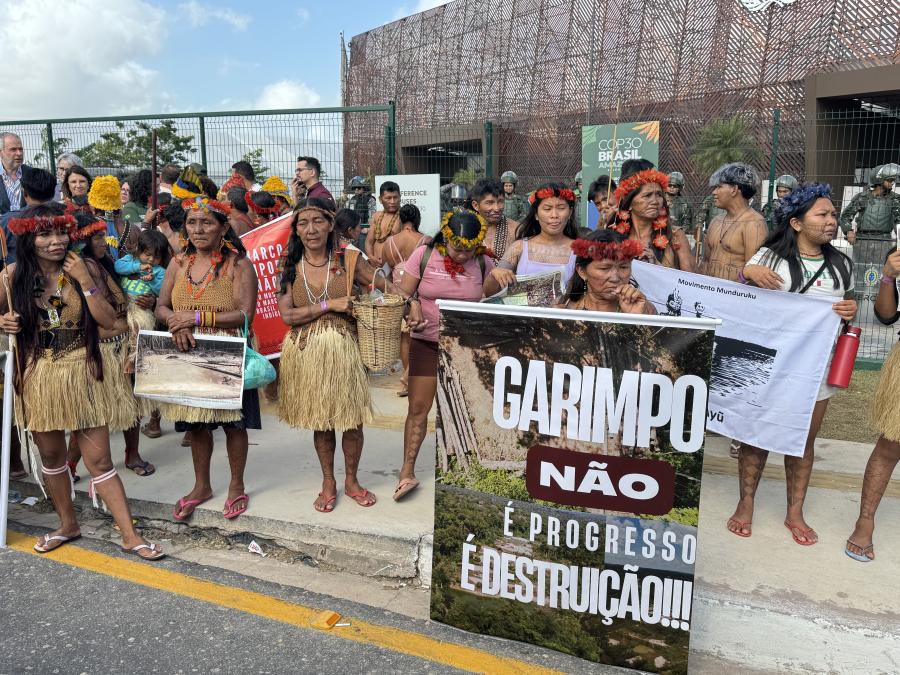
By Edson Krenak (Krenak, CS Staff)
Indigenous Peoples represent one of the most significant multilateral and democratic contributions to climate and land issues, as they are the frontliners of the climate crisis, leaders in ecosystem protection, legal land tenure, and sustainable development. However, at the COP, they struggled to be heard.
The unprecedented scale of participation and protest of and by Indigenous Peoples at COP30 in Belem shows that the COP was actually a "coup" against Indigenous Peoples and biomes across the host country of Brazil and the world. As noted by The Conversation, among others, and as seen by us on the ground, over 3,000 Indigenous delegates attended. “However, only 360 secured passes to the main negotiating 'Blue Zone,' compared to 1,600 delegates linked to the fossil fuel industry. Inside the negotiating rooms, it was business as usual, with Indigenous groups remaining as observers, unable to vote or attend closed-door meetings.”
The choice of hosting the COP in the Amazon rainforest was symbolically apt but logistically challenging, as it enabled and accelerated several controversial infrastructure projects that cleared the forests, built more ports, and other similar projects. (for example, the Avenida Liberdade). Hosting the conference in the Amazon cost hundreds of millions of dollars in a region where many still lack basic amenities. It promised inclusion and was even named the “Indigenous COP” for members of the host country, but delivered exclusion and tokenism. The conference was held in Belém, but it was a world away from our villages and territories. Even when we were granted a seat at the table as negotiators, the process was designed to silence Indigenous Peoples. Indigenous delegates were given individual tickets to enter the multilateral spaces, only to be placed last on the list and told we could speak only "if there's time." There was never time. Additionally, the lack of transparency and integrity in the process left everyone dissatisfied. Documents were altered overnight, with Indigenous issues that had been proposed on previous days being excluded without explanation or justification. The COP President and even the Brazilian hosts did not visit the Indigenous Caucus, which met every single morning to discuss priorities and how Indigenous Peoples from the world's seven socio-cultural regions could contribute to the talks.
Ultimately, the contributions of Indigenous Peoples—who have proven to be champions with immensely effective solutions for addressing the climate crisis, biodiversity loss, and the protection of biomes—were overlooked. The final session, witnessed by many shocked and shamed, had Colombia threatening to block the weak agreement for being ignored, Russia belittling Latin American countries, calling them kids and inefficient, the same way they treat many Indigenous communities on their own lands. African countries, like Nigeria, criticized the imposition of a just transition focused on energy extraction.
The root causes of the climate crisis were ignored. The relentless economic growth driven by the mining industry and agribusiness, driving forces fueling violence, deforestation, biodiversity loss, and harm to Indigenous Peoples and territories, was never seriously challenged. The most critical issue of all, a phase-out of fossil fuels, was entirely omitted from the texts, thanks to the influence of oil and gas interests and the passivity of European nations. Wealthy countries like Japan, Saudi Arabia, France, and Germany blocked the leadership of the Global South. At the same time, the corporations that plunder our territories systematically work to weaken the political power of Indigenous Peoples and even critical scientists.
Some of the most important Brazilian biomes, for decades ravaged by agribusiness, so-called "clean" energy projects, and iron ore, nickel, and lithium extraction, weren't even on the agenda. Meanwhile, the violence in these regions intensifies, as our Xavante and Guarani relatives in the Cerrado biome and Pataxó people in the Atlantic Forest can attest.

Breakthroughs and Leadership
Inside the negotiating rooms, there were no real breakthroughs on forests, biodiversity, or climate finance. Despite the visibility of these issues, the Indigenous Peoples' voices were just preambular in many debates, serving a symbolic process, not real decision-making.
However, great things happened outside the official halls. The global Indigenous movement utilized the COP30 platform to secure vital land demarcations and amplify the visibility of communities struggling with the climate crisis, as well as to defend their territories. This is where our power lies. Our fight continues. We will not stop demanding reparations, forcing polluters and their government enablers to pay, and protecting our forests and rivers. Our liberation is tied to the Earth's, and we will never surrender.
The erosion of good faith and integrity, the colonial resurgence of disrespect by wealthy countries, and the challenge to the narrative of just transition are the three main characteristics of neocolonialism in the 21st century, orchestrated by polluters, big tech companies, and populists. Indigenous Peoples are again at the center of this crisis because they are the frontliners facing impacts more severe than everyone and offering solutions, struggling to be heard.
Is the TFFF a Breakthrough?
The Tropical Forest Forever Facility (TFFF) is a Fund to “be a permanent global facility that uses investment returns to value the global public services provided by tropical forests and reward countries for their conservation.” The Fund can be a massive threat to Indigenous Peoples for two reasons: first, ontologically, it sees the forest as a service provider, not a home. This is another utilitarian approach to Nature that is dangerous and not familiar to Indigenous Peoples.
The second reason is a bunch of technical challenges that put Indigenous rights and self-determination at risk. The conversations about, for example, Free, Prior, and Informed Consent are framed as consultation and dialogue, explicitly avoiding the mandatory character of the standard enshrined in the ILO Convention 169 and the UN Declaration on the Rights of Indigenous Peoples (UNDRIP). It sees Indigenous Peoples as stakeholders, not right holders, and a decisive voice.
Also, the lack of clear and specific indicators for human rights and the rights of Indigenous Peoples was highly concerning, particularly in the context of adaptation. Furthermore, there is no plan for the restoration and remediation of damages caused by fossil fuels and by the large-scale projects of the so-called "just transition," such as mining and infrastructure, which are impacting Indigenous communities.
TFFF and Indigenous Peoples
Indigenous leaders are seeing the TFFF as a double-edged sword: a potential historic victory for forests, or a process that will double injustice and accelerate the causes of the climate crisis. Its success hinges not only on rigorous, transparent, and just design, but on the effective participation of forest and river peoples, the Indigenous Peoples. Without these, it will be yet another fund that raises billions but makes little change in the world's most critical ecosystems.
To put this in numbers, the model prioritizes paying private investors approximately 6 billion per year, while allocating 3 to 4 billion for forest countries. While Indigenous Peoples are promised to receive 20% of that, it is unclear how direct access will be implemented, considering the monitoring mechanism, for example.
If the TFFF relies solely on satellite data, it will ignore Indigenous Peoples’ stewardship and knowledge, punishing countries for deforestation that Indigenous communities may not control. The exclusionary and unjust penalty system is also unfair: the TFFF will offer a mere $4 USD per hectare of preserved forest, from which 20%, $0.80, is allocated for Indigenous Peoples, even though they are the biggest stewards of the forests and are responsible for protecting 80% of the world's biodiversity in their territories. The TFFF imposes a 100-fold penalty for every hectare of forest lost. Indigenous Peoples around the world don't have their territories safe and protected, even when they have the land back and titles. In Brazil, the Auwe Xavante Peoples, for example, are struggling in their territories with soy, meat, and infrastructure projects devastating their lands, forests, and rivers, as demonstrated in Cultural Survival’s report “The Price of Green. “
Many organizations also have voiced these concerns. The Arayara Institute, responsible for the Amazon Climate Hub during the COP, for example, states: "if the Fund is implemented the way it is, there is a great risk of it becoming another mechanism that mobilizes grand amounts of money, but with little results."
Overall, the COP is a top-down mechanism that, in its current form, legitimizes the continued exclusion of Indigenous Peoples from real power and governance, threatening to perpetuate the very injustice it claims to address.

Along with Indigenous Peoples around the world, especially those living in the forests, Cultural Survival defends the following five points related to the TFFF:
1. Ensuring Indigenous leadership and effective participation in the decision-making process
Decisions about Indigenous territories and sacred lands must have full participation of Indigenous peoples and proper Free, Prior and Informed Consent. Indigenous peoples must have equal power because they are the champions of conservancy and protection.
2. Fair Funding and direct access
At least half of all funds should go directly to Indigenous Peoples, Traditional communities, and their organizations in a co-designed and co-built governance. Without delays and harsh bureaucracy from governments, banks, and institutions.
3. Not Financing Destruction
The fund must have a moral compass to avoid funding destructive industries, such as fossil fuels and large-scale mining (See our Advocacy Brief, which highlights how irresponsible Sigma Lithium is impacting Indigenous peoples and local communities while receiving funding from the Climate Fund). The TFFF cannot be an opportunity for more greenwashing.
4. Strengthening what already works
There are successful models, such as the Amazon Fund, that need improvement, for example, by being more transparent and community-focused. There is a real risk that the new fund will replace it, rather than improve it.
5. Including other biomes that are critical for forests
The fund must be ambitious and creative by protecting biomes that are critical to the tropical forests. In Brazil, the cerrado is a vital carbon sink and the birthplace of major river systems, deeply connected to the Amazon rainforest, much like the Miombo woodlands on the African continent and the peat swamps in Indonesia and Malaysia. These biomes are essential to climate stability and the survival of Indigenous Peoples, and they must be fully included and prioritized in any global forest and climate finance mechanism.
For multilateralism, which was defended and praised during this COP, to deliver real and effective solutions and concrete actions, it must include Indigenous Peoples, their worlds, and all biomes, along with their defenders. Since the only approach to the climate crisis is through climate justice, it must be a democratic process, where a broad and Indigenous perspective of all species democracy.
"We must recognize ourselves as only one member of the great democracy of species and understand that we, like every other successful organism, must play by the rules that govern ecosystem function. “We need acts of restoration, not only for polluted waters and degraded lands, but also for our relationship to the world. We need to restore honor to the way we live, so that when we walk through the world, we don't have to avert our eyes with shame, so that we can hold our heads up high and receive the respectful acknowledgement of the rest of the earth's beings. When we rely deeply on other lives, there is an urgency to protect them. Our ancestors, who had so few material possessions, devoted a great of attention to this question, while we are drowning in possessions, scarcely give it a thought."
Robin Wall Kimmerer, The Democracy of Species



